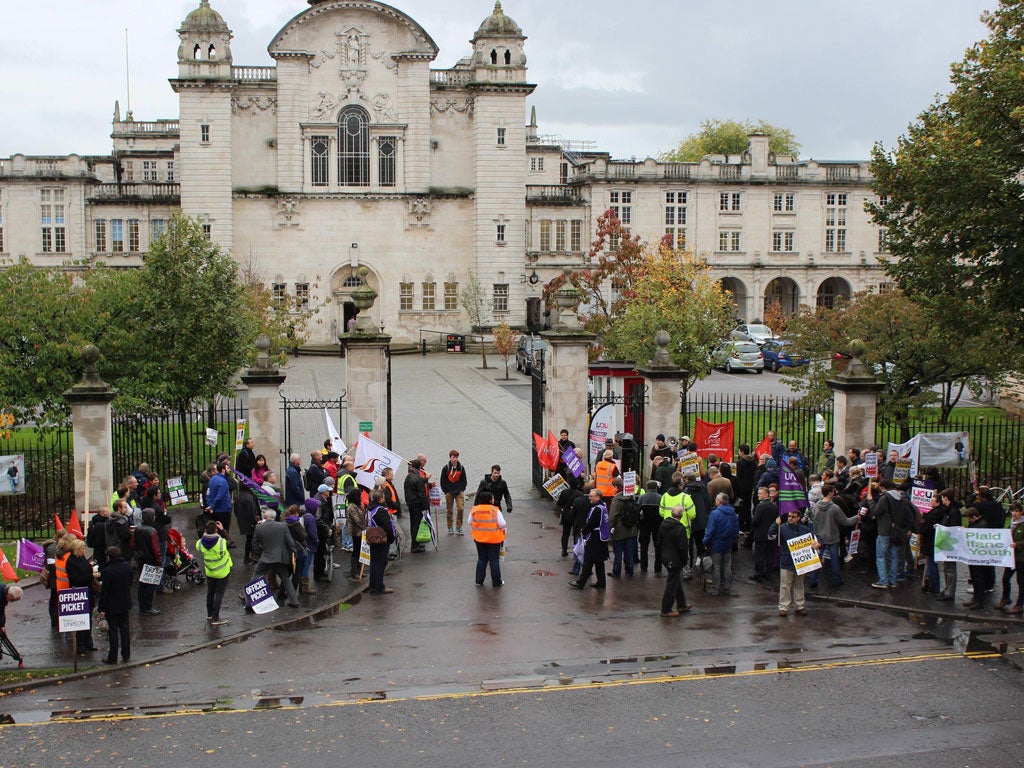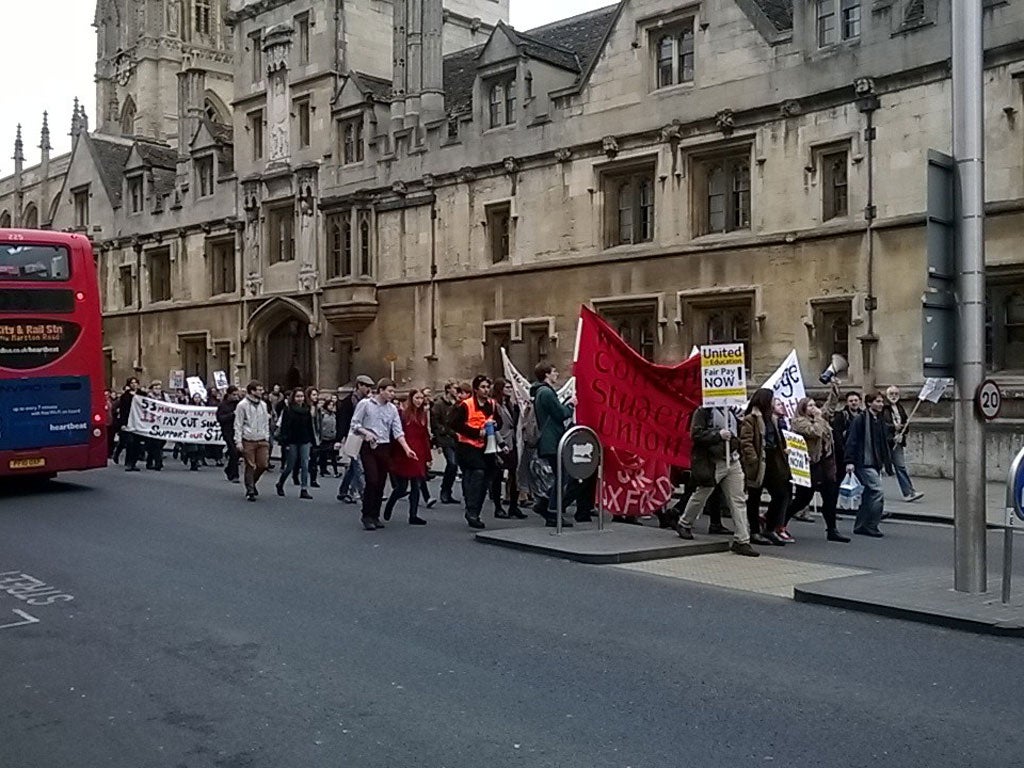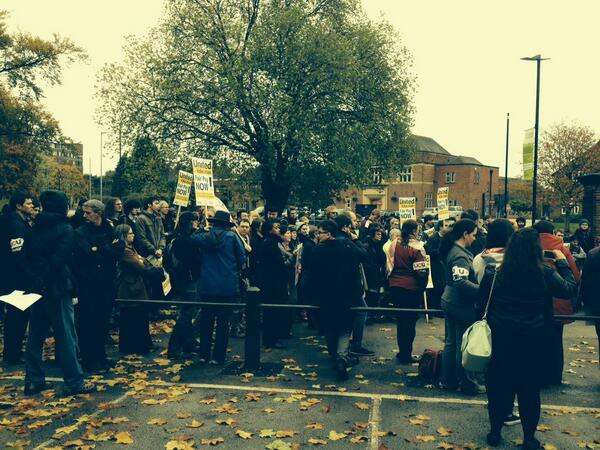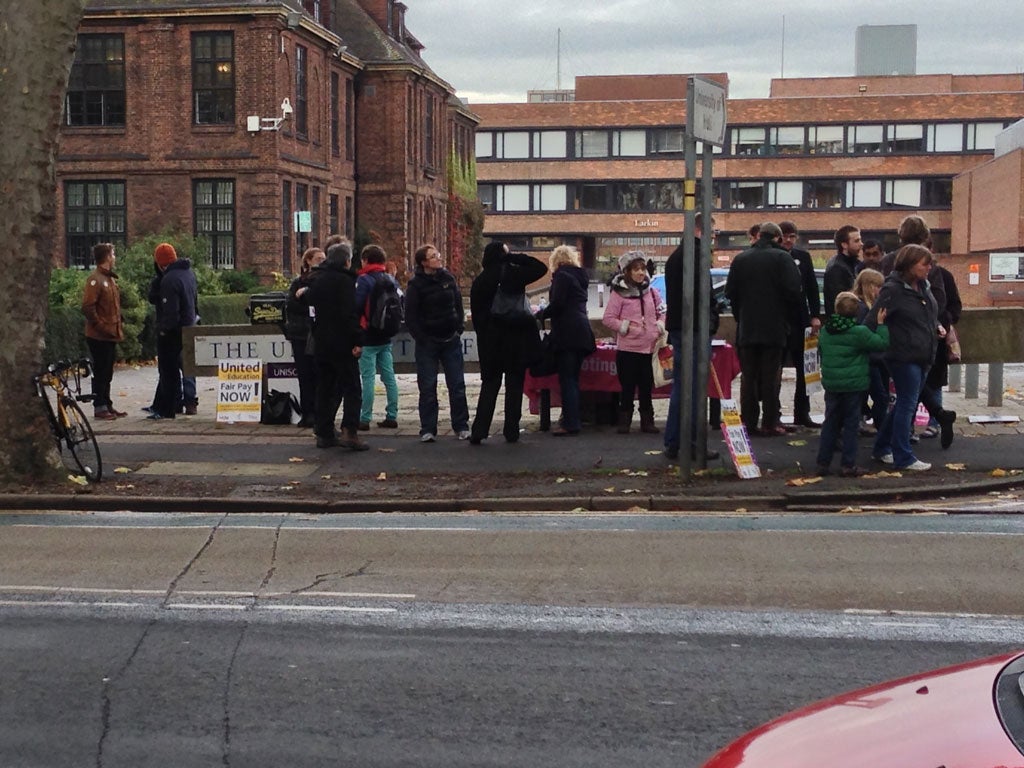University life comes to a standstill across Britain as academic staff go on strike
Most university campuses affected as staff strike over pay

Your support helps us to tell the story
From reproductive rights to climate change to Big Tech, The Independent is on the ground when the story is developing. Whether it's investigating the financials of Elon Musk's pro-Trump PAC or producing our latest documentary, 'The A Word', which shines a light on the American women fighting for reproductive rights, we know how important it is to parse out the facts from the messaging.
At such a critical moment in US history, we need reporters on the ground. Your donation allows us to keep sending journalists to speak to both sides of the story.
The Independent is trusted by Americans across the entire political spectrum. And unlike many other quality news outlets, we choose not to lock Americans out of our reporting and analysis with paywalls. We believe quality journalism should be available to everyone, paid for by those who can afford it.
Your support makes all the difference.Lectures have been cancelled, libraries have shut and campuses have been closed off today, as British academics and administrative staff stage a one-day strike in a major dispute over pay and conditions.
Picket lines and marches sprang up across the UK in what has largely been a good-natured national walkout.
Arranged via a practically unprecedented coalition of the three major unions representing university academic and support staff – UCU, Unite and Unison – the strike is happening in protest at the one per cent pay rise offered to university strike this year.
According to UCU, university staff are angry at the employers’ refusal to budge on the offer, which represents a real-terms pay cut of 13 per cent since 2008.
The three unions said that, between them, tens of thousands of their members would be turning out across the country.
Many students also turned out in strong show of support for their lecturers. In a statement, the student-run National Campaign Against Fees and Cuts said that these strikes represent “a pivotal moment for the fight for education and the fight to save the welfare state”.
“Students have joined the pickets and come out in solidarity. Last night, a number of campuses were occupied and today we have been standing with our staff. Student unions have been almost unanimous in their support – showing a major move forward from reluctance in previous years.
A large, animated of around 500-600 people marched from the University of Leeds campus to the city. The demonstration culminated with talks by representatives from the unions, and from the President of the Leeds Metropolitan student union, which is supporting the action.

In central Oxford, a couple of hundred gathered at Carfax Tower at 2pm, armed with banners. They marched down to the town hall, then up Cornmarket Street, along the iconic Broad and High Streets, where they caused small traffic jams. The protest finished in the foyer of Exam Schools, the main lecture hall. University security arrived at soon after the crowd began occupying the foyer in a sit-down strike.

In Birmingham, students and staff were blocking every gate to the university by 9am, ahead of a midday rally. One student said: “I think it’s fair that lecturers get better pay. Students have to support staff and staff support students. We’re hoping to raise awareness. People question why student fees are up if staff aren't getting paid more. I don't understand how lecturers have enough to support their families”.

Exeter faced minimal disruption with the university’s schedule continuing largely uninterrupted. With only around a quarter of lecturers unionised and considerably less thought to be on strike, numbers at the picket line were few. A small demonstration took place near the main buildings in the morning, before protesters left for the city centre, where they planned to join a larger demonstration.
There were more than 100 strikers at Cardiff, both staff and students, amassing outside of the university’s main building and stopping passers-by. The picket line assembled at 8am, and had dispersed entirely by 1pm.
Bridget Taylor, a student who joined the strike, claimed that protesters did a good job: “I support what the lecturers are doing, and I support the fact that they’re going on strike for higher pay. People are paying £9,000 a year now, and they’re going to get less for their money.”
At UEA, the strike affected the majority of the teaching staff who were not already away for half term. There were a few half-hearted picket lines, but the bigger fact of the day was a solidarity march from a group of students.
Although the union recently passed highly controversial laws forbidding protest on campus, this small march lasted for almost two hours before dying out. There were no major clashes or violence - it is Norwich after all - but an overall sense of righteous protest and solidarity was felt between teaching staff and students.
In Southampton, a good crowd had been gathered for several hours before their official 1pm rally where all three unions, backed by students and a local Labour councillor, took a stand.
Catherine Pope of UCU said: “There was a real sense that something was happening here; we've not managed to do that sort of sustained action before.”

University staff manned every available entrance to the Newcastle campus this morning, bundled up against the cold in luminous yellow jackets. The main event was at Grey’s Monument at 1 pm, which had a good turn out from staff, students and the general public, all enthusiastically listening to the invited speakers from the unions. Judging from the amount of clapping and cheering, there is definitely a lot of support for the cause in Newcastle.

Students and staff at Sussex occupied one of the main lecture theatres on campus for 24 hours, ending early this morning. The occupation was to show support of the Halloween strike and generally raise awareness of it.
That said, the actual number of people on the picket line was fairly low, with few posters or banners. As well as this, plans to march over to The Keep, a new historical resource centre built by the university due to be opened by the Queen today came to nothing. An idea to sing a rewritten "cuts and austerity" based national anthem fell flat due to a lack of organisation.

Additional reporting by: Ciara Cohen-Ennis, Harrison Jones, Michael O'Connell-Davidson, Oliver Hughes, Tria Lawrence, Alexander Woolley, Rosie Collington, Lucy Gray, Chris Mifsud
Join our commenting forum
Join thought-provoking conversations, follow other Independent readers and see their replies
Comments